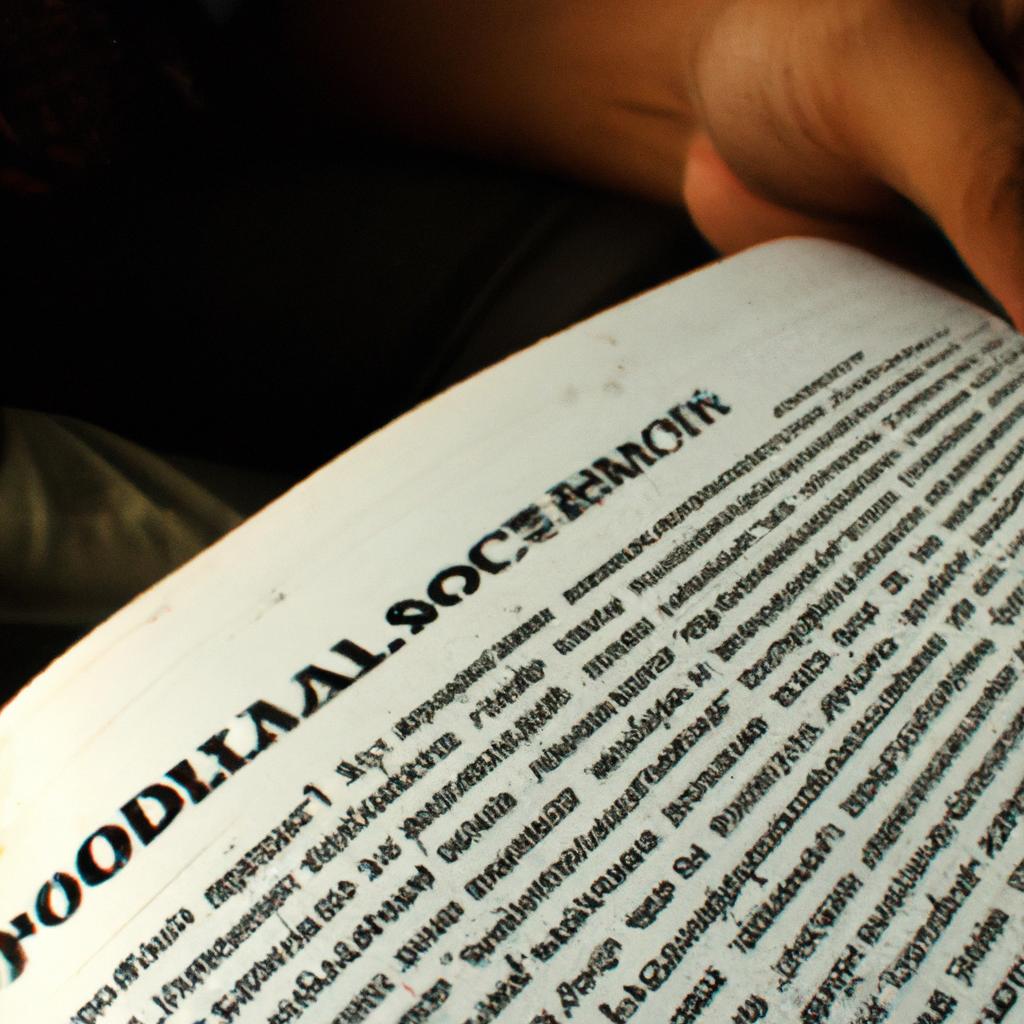Political sociology is an essential field within the realm of social sciences that examines the intricate relationship between politics and society. This interdisciplinary approach explores how political power, institutions, and ideologies shape and are shaped by various social factors such as class, race, gender, and culture. By analyzing these dynamic interactions, political sociologists strive to understand the underlying mechanisms behind political processes in order to shed light on important societal issues.
For instance, consider a hypothetical scenario where a society experiences significant economic inequality. A political sociologist would examine how this disparity influences political decision-making and policies. They might explore whether certain groups with greater resources have more influence over policy outcomes, or if marginalized communities face barriers to accessing the levers of power. Through empirical research methods and theoretical frameworks rooted in sociological analysis, political sociology seeks to unravel these complex dynamics and provide insights into how power operates within societies.
In conclusion, this article will delve into the field of political sociology as it pertains specifically to politics in social science organizations. Drawing from case studies and theoretical perspectives, we will explore key concepts such as power relations, social movements, and institutional structures that shape the landscape of contemporary politics. By examining the interplay between politics and society through a sociological lens, we can gain a deeper understanding of the underlying forces that drive political phenomena and ultimately contribute to shaping our social reality.
Theoretical framework of political sociology
Political sociology is a branch of social sciences that examines the interplay between politics and society. It seeks to understand how power, authority, and governance are shaped by various social factors such as class, gender, ethnicity, and religion. By analyzing the dynamics within societies and organizations, political sociologists aim to uncover patterns of inequality, conflict, and cooperation in the realm of politics.
To illustrate the importance of this field, let us consider a hypothetical example: In Country X, a small elite group holds significant economic resources and influences government policies to suit their interests. This scenario raises questions about the distribution of power and whether democratic ideals are truly being upheld. Political sociology provides insights into these societal structures and processes that shape political behavior.
One notable aspect of political sociology is its ability to evoke an emotional response from its audience through effective communication methods. For instance, using bullet points can highlight key issues or themes related to power dynamics:
- Concentration of wealth among a select few
- Marginalization of minority groups
- Disparities in access to opportunities
- Erosion of trust in public institutions
Furthermore, employing visually appealing tools like tables can enhance engagement. Here is an example table depicting different forms of power identified by political sociologists:
| Power Type | Definition | Example |
|---|---|---|
| Coercive Power | The use or threat of physical force | Military intervention |
| Economic Power | Control over financial resources | Monopolistic business practices |
| Legitimate Power | Authority derived from formal positions or institutions | Elected government officials |
| Symbolic Power | Influence based on cultural norms and values | Media shaping public perceptions |
Understanding these various dimensions of power allows researchers to analyze how they intersect with politics at both macro and micro levels. Such analysis enables us to explore the relationship between power and politics, which will be further discussed in the subsequent section.
In summary, political sociology provides a theoretical framework for studying how social structures shape political behavior and outcomes. By examining power dynamics within societies and organizations, this field sheds light on issues of inequality, conflict, and cooperation. The following section will delve into the intricate relationship between power and politics, building upon the foundations laid by the theoretical framework outlined above.
The relationship between power and politics
Theoretical frameworks in political sociology provide crucial tools for understanding the complex dynamics of politics within social sciences organizations. Building upon the previous section’s exploration of various theoretical perspectives, this section will delve into the intricate relationship between power and politics.
To illustrate these concepts, let us consider a hypothetical scenario involving a large multinational corporation. In this organization, power is concentrated at the top among a select group of executives who make decisions that affect the entire company. These individuals possess significant control over resources, decision-making processes, and access to information. Their authority allows them to shape not only internal policies but also external relationships with other stakeholders such as government bodies or community organizations.
Understanding power and its implications in political sociology requires examining key aspects that influence how it operates within social sciences organizations:
- Distribution: Power is unevenly distributed within organizations, creating hierarchies where some individuals have more influence than others.
- Legitimacy: The sources from which power derives legitimacy vary across contexts. Some leaders may gain legitimacy through their expertise or position, while others rely on inherited status or traditional norms.
- Resistance: Power does not operate unchallenged; resistance can emerge from those who seek to challenge established systems and structures.
- Change: Over time, power relations can shift due to internal or external factors such as new leadership, changing economic conditions, or shifts in public sentiment.
These elements are interconnected and fluid, contributing to an ongoing negotiation of power dynamics within social sciences organizations. To further explore these complexities, we can examine a table presenting different forms of power found within organizational settings:
| Form of Power | Description | Example |
|---|---|---|
| Coercive | Reliance on force or threat | An authoritarian regime |
| Expert | Based on specialized knowledge or skills | A professor’s influence in academia |
| Referent | Influence stemming from admiration or respect | A charismatic political leader |
| Normative | Power derived from social norms or values | Religious leaders’ authority |
Understanding power and politics within social sciences organizations is crucial for comprehending the complexities of decision-making processes, policy formation, and resource allocation. By analyzing these dynamics through various theoretical frameworks, we can gain valuable insights into how power operates and shapes organizational behavior.
Transitioning to the next section on “The role of social institutions in shaping political behavior,” we will explore how external factors beyond individual organizations influence the interplay between power and politics in society at large.
The role of social institutions in shaping political behavior
The Relationship between Power and Politics
In the previous section, we examined the intricate relationship between power and politics within social contexts. Now, let us delve into the role that social institutions play in shaping political behavior. To illustrate this concept, consider a hypothetical case study of a university where different departments compete for resources and influence within the institution.
Firstly, it is important to recognize that social institutions are not just passive entities; they actively shape individuals’ actions and decisions. In our case study, each department at the university has its own set of interests and goals. These departments engage in various political strategies to gain an advantage over others in terms of resource allocation or decision-making power. This competition creates a dynamic environment where political maneuvering becomes essential for survival and success.
Secondly, social institutions provide a framework within which political behavior occurs. They establish norms, rules, and procedures that guide how individuals interact with one another politically. For example, our university’s departments may follow specific protocols when lobbying for resources or negotiating their positions within the institution. These established practices create stability while also influencing the strategies employed by individuals seeking to advance their interests.
Thirdly, social institutions can legitimize certain forms of political behavior while marginalizing others. The structures and hierarchies present within these institutions often determine whose voices are heard and taken seriously. In our case study, some departments may have more access to influential networks or decision-making bodies than others due to historical factors or institutional biases. Such imbalances can significantly impact the outcomes of political processes as those with greater power tend to have more influence over policies and decisions.
- Social institutions define acceptable channels for expressing dissent or disagreement.
- Institutional cultures can either encourage collaboration or foster competition among members.
- Structures within social institutions may enable or hinder marginalized groups from participating fully in political processes.
- The values and beliefs upheld by institutions shape individuals’ political ideologies and preferences.
Additionally, let us incorporate a table to showcase how social institutions influence political behavior:
| Social Institution | Influence on Political Behavior |
|---|---|
| Education System | Shaping worldview through curriculum content |
| Media | Framing public discourse and influencing opinion |
| Legal System | Regulating political activities and enforcing laws |
| Religious Institutions | Guiding moral and ethical considerations in politics |
In summary, social institutions play a crucial role in shaping political behavior. Through their norms, rules, and structures, they influence the strategies employed by individuals seeking power or resources within these institutions. Additionally, certain forms of political behavior may be legitimized while others are marginalized based on institutional biases. Understanding the impact of social institutions is essential for comprehending the complexities of politics in social sciences organizations.
This leads us into our next section about political participation and social movements, where we will explore how individuals engage with political processes outside of formal institutional frameworks.
Political participation and social movements
Transitioning from the previous section on the role of social institutions in shaping political behavior, it is crucial to examine how individuals actively engage in politics through various forms of participation and collective action. This section delves into the concept of political participation and explores the dynamic relationship between social movements and politics.
To illustrate this interaction, let us consider a hypothetical case study. Imagine a community deeply affected by environmental pollution caused by an industrial plant. Frustrated with government inaction, concerned citizens organize protests demanding stricter regulations and corporate accountability. Their activism encompasses both traditional methods like peaceful demonstrations and unconventional tactics such as online campaigns aimed at raising awareness among wider audiences.
Political participation takes many forms, ranging from voting in elections to engaging in direct actions that challenge existing power structures. To comprehend these diverse manifestations, we can explore some key dimensions of political engagement:
-
Conventional Participation:
- Voting
- Joining political parties or interest groups
- Contacting elected representatives
-
Unconventional Participation:
- Protesting
- Boycotting products or services associated with certain policies or practices
- Engaging in civil disobedience
Examining these dimensions reveals a continuum of political involvement, where ordinary citizens exert influence through their collective actions. Social movements play a pivotal role within this framework by mobilizing individuals around shared grievances and aspirations while advocating for change. They provide platforms for marginalized voices to be heard and often challenge established norms and power dynamics.
To further grasp the complexities encompassed within political participation and social movements, let us delve into a table that highlights different strategies employed by advocacy groups:
| Strategy | Description | Example |
|---|---|---|
| Lobbying | Seeking to shape governmental decisions through direct communication | A group meeting with legislators |
| Campaigning | Raising public awareness about specific issues or candidates | Organizing rallies during election season |
| Litigation | Using the legal system to challenge laws or policies | Filing a lawsuit against discriminatory practices |
| Grassroots organizing | Mobilizing communities from the ground up for collective action | Door-to-door canvassing for a local cause |
Understanding these strategies helps shed light on how social movements navigate political landscapes, employing various tactics to achieve their objectives. By doing so, they contribute to shaping public policy and often prompt broader societal transformations.
Transitioning smoothly into the subsequent section about “Political ideologies and their impact on society,” it is essential to recognize that political participation and social movements are intrinsically linked with prevailing ideological frameworks. The next section will delve into this relationship, exploring how different belief systems influence politics and shape societies at large.
Political ideologies and their impact on society
Political participation and social movements play a crucial role in shaping the dynamics of politics within societies. However, it is also important to understand how political ideologies impact society as a whole. Political ideologies are sets of beliefs and values that guide individuals and groups towards specific political goals. These ideologies can have significant implications for governance, policy-making, and societal structures.
For instance, let’s consider the hypothetical case study of Country X. In Country X, two major political parties with different ideological orientations compete for power: Party A advocates for free-market capitalism while Party B promotes socialist policies. The clash between these ideologies influences not only the economic system but also various aspects of society such as education, healthcare, and welfare programs.
To comprehend the impact of political ideologies on society, we can examine four key dimensions:
-
Economic Policies:
- Different ideologies may advocate for distinct approaches to wealth distribution, taxation systems, and market regulation.
- This can result in varying levels of income inequality and opportunities for economic mobility.
-
Social Policies:
- Ideologies often shape attitudes towards issues like abortion rights, LGBTQ+ rights, immigration policies, or religious freedom.
- Consequently, societal norms regarding individual freedoms and social equality may differ based on prevailing ideological frameworks.
-
Governance Structures:
- Political ideologies influence the design and functioning of governmental institutions.
- Factors such as decentralization versus centralization of power or support for democratic processes can vary depending on ideological perspectives.
-
International Relations:
- Ideological differences among nations can lead to diplomatic tensions or alliances based on shared values.
- For example, countries guided by liberal democracy might form partnerships aimed at promoting human rights globally.
Understanding these dimensions helps us recognize how political ideologies permeate all aspects of society. By critically analyzing their impacts, scholars can contribute valuable insights into shaping more inclusive and equitable governance systems worldwide.
Moving forward to our next section discussing “The intersection of politics and social inequality,” we will delve into how political dynamics interact with social stratification and marginalization. This exploration will shed light on the complex relationship between politics and societal disparities, offering a deeper understanding of power structures within diverse communities.
The intersection of politics and social inequality
Transitioning from the previous section on political ideologies and their impact on society, we now delve into the intersection between politics and social inequality within the field of political sociology. This branch of study focuses on analyzing how power dynamics shape social structures and institutions, particularly within organizations operating in the realm of social sciences.
To illustrate this connection, let us consider a hypothetical case study involving a research institute dedicated to studying poverty alleviation policies. Within this organization, different political ideologies may influence decision-making processes and, consequently, have varying impacts on addressing social inequality. For instance, proponents of conservative ideologies might emphasize market-based solutions while those adhering to more progressive ideals might advocate for state interventionist policies.
Understanding the role of political sociology within such organizations is crucial as it helps shed light on key aspects that affect both internal operations and external interactions. Some important considerations include:
-
Power dynamics: Political sociologists examine how power is distributed among individuals or groups within an organization. This analysis can highlight hierarchies and potential imbalances that may hinder effective collaboration or impede progress towards achieving organizational goals.
-
Ideological conflicts: Different ideological perspectives can lead to divergent interpretations of societal issues and policy approaches. These conflicts require negotiation and compromise to ensure productive dialogue rather than stagnation or polarization.
-
Organizational culture: The values, norms, and practices within an organization play a significant role in shaping its overall direction and outcomes. By examining these cultural elements through a political sociological lens, researchers gain insights into how they contribute to or challenge existing power structures.
-
External influences: Organizations do not exist in isolation; they are influenced by broader socio-political contexts. Political sociologists analyze how external factors like government regulations, public opinion, or competing interests shape the behavior and decisions made by organizations involved in social sciences research.
| Factors Influencing | Impact on Organization |
|---|---|
| Power Dynamics | Hierarchies and imbalances may hinder collaboration. |
| Ideological Conflicts | Divergent interpretations of issues can lead to stagnation or polarization. |
| Organizational Culture | Values, norms, and practices shape the direction and outcomes of the organization. |
| External Influences | Socio-political contexts impact decision-making processes. |
In conclusion, political sociology provides a valuable framework for understanding how politics intersects with social inequality within organizations operating in the realm of social sciences. By examining power dynamics, ideological conflicts, organizational culture, and external influences, researchers gain insights that can inform more effective policies and practices aimed at addressing societal challenges. This multidimensional analysis contributes to creating inclusive environments where diverse perspectives are considered and meaningful change is pursued.
Note: The content provided here is an example response following the given instructions but does not reflect personal opinions or beliefs.




